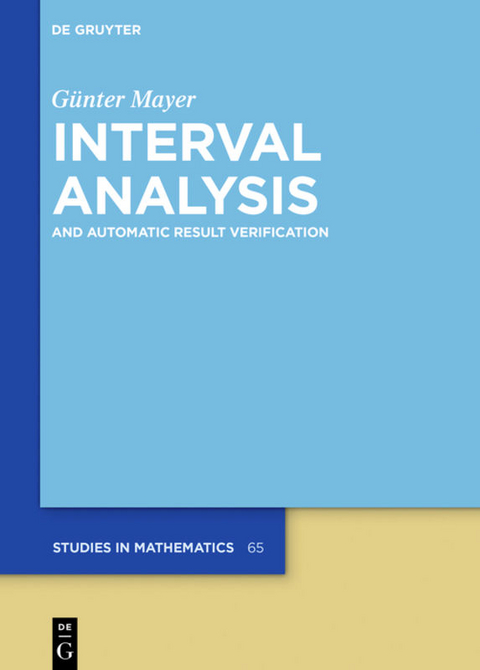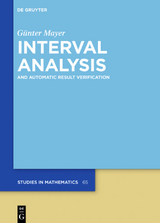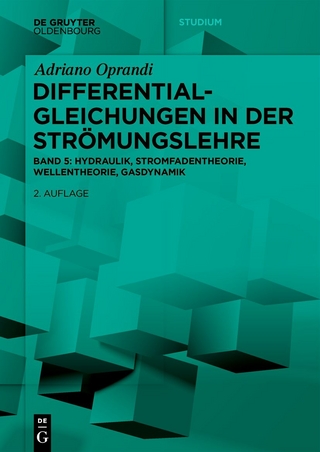Interval Analysis
and Automatic Result Verification
Seiten
The series is devoted to the publication of monographs and high-level textbooks in mathematics, mathematical methods and their applications. Apart from covering important areas of current interest, a major aim is to make topics of an interdisciplinary nature accessible to the non-specialist. The works in this series are addressed to advanced students and researchers in mathematics and theoretical physics. In addition, it can serve as a guide for lectures and seminars on a graduate level. The series de Gruyter Studies in Mathematics was founded ca. 30 years ago by the late Professor Heinz Bauer and Professor Peter Gabriel with the aim to establish a series of monographs and textbooks of high standard, written by scholars with an international reputation presenting current fields of research in pure and applied mathematics.While the editorial board of the Studies has changed with the years, the aspirations of the Studies are unchanged. In times of rapid growth of mathematical knowledge carefully written monographs and textbooks written by experts are needed more than ever, not least to pave the way for the next generation of mathematicians. In this sense the editorial board and the publisher of the Studies are devoted to continue the Studies as a service to the mathematical community. Please submit any book proposals to Niels Jacob.
This self-contained text is a step-by-step introduction and a complete overview of interval computation and result verification, a subject whose importance has steadily increased over the past many years. The author, an expert in the field, gently presents the theory of interval analysis through many examples and exercises, and guides the reader from the basics of the theory to current research topics in the mathematics of computation. Contents Preliminaries Real intervals Interval vectors, interval matrices Expressions, P-contraction, ε-inflation Linear systems of equations Nonlinear systems of equations Eigenvalue problems Automatic differentiation Complex intervals
This self-contained text is a step-by-step introduction and a complete overview of interval computation and result verification, a subject whose importance has steadily increased over the past many years. The author, an expert in the field, gently presents the theory of interval analysis through many examples and exercises, and guides the reader from the basics of the theory to current research topics in the mathematics of computation. Contents Preliminaries Real intervals Interval vectors, interval matrices Expressions, P-contraction, ε-inflation Linear systems of equations Nonlinear systems of equations Eigenvalue problems Automatic differentiation Complex intervals
Günter Mayer, University of Rostock, Rostock, Germany.
"The exposition is well structured and is written in a mathematically strict and comprehensive manner which contributes to an easy reading. As can be expected, due to volume restrictions, some of the sub-fields of interval analysis are not presented up to their recent state of the art, but this does not decrease the value of the book."
In: Zentralblatt für Mathematik
"The book is an in-depth overview of validated numerics, an emerging branch of scientific computing. Plenty of exercises and examples guide the reader from the very basics to current research topics."
Ferenc Agoston Bartha in: Mathematical Reviews Clippings (2018), MR3726854
| Erscheinungsdatum | 14.04.2017 |
|---|---|
| Reihe/Serie | De Gruyter Studies in Mathematics ; 65 |
| Zusatzinfo | 16 b/w ill., 16 b/w tbl. |
| Verlagsort | Berlin/Boston |
| Sprache | englisch |
| Maße | 170 x 240 mm |
| Gewicht | 1024 g |
| Themenwelt | Mathematik / Informatik ► Mathematik ► Analysis |
| Schlagworte | Automatische Differentiation • Computerarithmetik • Intervalalgebra • Intervalanalyse • Richrigkeit von Ergebnissen |
| ISBN-10 | 3-11-050063-9 / 3110500639 |
| ISBN-13 | 978-3-11-050063-9 / 9783110500639 |
| Zustand | Neuware |
| Haben Sie eine Frage zum Produkt? |
Mehr entdecken
aus dem Bereich
aus dem Bereich
Band 5: Hydraulik, Stromfadentheorie, Wellentheorie, Gasdynamik
Buch | Softcover (2024)
De Gruyter Oldenbourg (Verlag)
CHF 83,90




